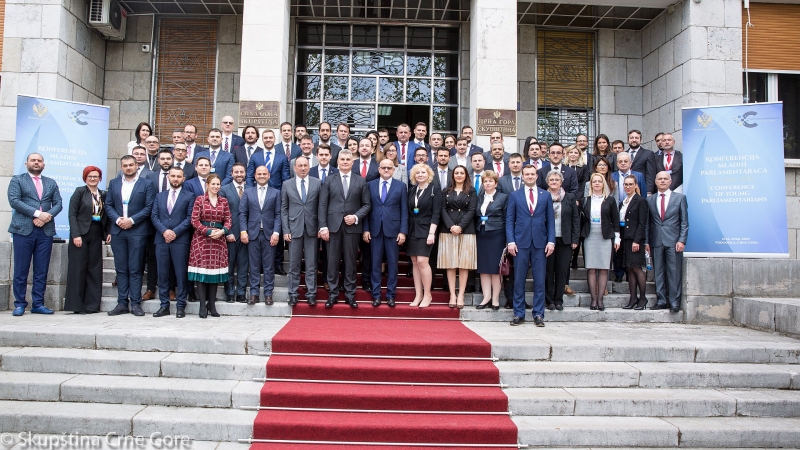"Conference of Young Parliamentarians of the European Union and the Western Balkans" was held, co-organised by the Montenegrin Parliament and the Committee on International Relations and Emigrants that gathered representatives of 20 parliaments of member states of EU and Western Balkans.
The Conference was opened by Mr Ivan Brajović, President of the Parliament of Montenegro, and Mr Duško Marković, the President of the Government of Montenegro, attended the opening ceremony.
Chairperson of the Committee on International Relations and Emigrants, Mr Andrija Nikolić, in a capacity as the Chair of the Conference, stressed that Europe and the Balkans needed young, energetic and progressive forces that were ready to respond to the challenges of the new age. Mr Nikolić pointed out that the citizens of Montenegro and the countries of the Western Balkans belonged to Europe and that it was the ideal of this region to spend the future in a united and developed European Union.
During three sessions of the Conference: "Western Balkans enlargement perspective after the EP elections 2019", "The role of the national parliaments in the Berlin process" and "Education as a Tool for Development", young parliamentarians sent strong messages of support to the European integration of the Western Balkans and expressed their unified position that enlargement policy has been one of the most successful European Union policies.
During the first session, participants of the Conference were addressed by the Minister of Foreign Affairs of Montenegro, Mr Srđan Darmanović, Minister of Foreign Affairs of Bosnia and Herzegovina, Mr Igor Crnadak and Deputy Minister for Europe and Foreign Affairs of the Republic of Albania, Ms Artemis Dralo. The speakers agreed in their assessment that the continuity of the enlargement policy was necessary for the stability, further economic development and the competitiveness of the European continent on a global scale. It was concluded that the future of the Western Balkans lied in the European Union and that there was no alternative to the European integration process.
Chairpersons of Committees on Foreign Affairs of parliaments of Hungary, the Republic of Croatia and the Slovak Republic, Mr Zsolt Nemeth, Mr Miro Kovač and Ms Katarina Csefalvayova discussed the issues of the role of national parliaments invlved in the Berlin process, as well as the member of the House of Representatives of the Belgian Federal Parliament, Ms Monica De Coninck. The key speakers, as well as the participants of the discussion, emphasised the importance of parliamentary cooperation within the framework of the Berlin Process and assessed that enlargement was part of the reform process and part of the solution. The renaissance of the European Union could begin with enlargement policy, was a common assessment of the participants of the session.
The keynote speakers discussing the topic of "Education as a Tool for Development", were the Ordinary Member of the Montenegrin Academy of Science and Arts, Mr Predrag Miranović, Chairperson of the Committee on EU Affairs, Slovak Parliament, Mr Ľuboš Blaha and the Head of EU Delegation to Montenegro, Mr Aivo Orav. The message has been sent from this session that education is a pillar of the economic development, and that better education made the country today and more democratic tomorrow. It was emphasised that education should not be solely focused on skills, but also on social responsibility and values.
The Conference was attended by representatives of parliaments of Austria, Belgium, Croatia, the Czech Republic, Germany, Greece, Hungary, Italian Republic, Latvia, Lithuania, Malta, Poland, Portugal, Romania, Slovakia, Slovenia, Albania, Bosnia and Herzegovina, North Macedonia, Kosovo and the Parliament of the host country of this meeting - the Parliament of Montenegro.
It was concluded at the end of the Conference that Montenegro, by organising this event, set the cornerstone in building a new model for the sake of networking of young parliamentarians from Europe. Participants of the Conference strongly supported the idea of establishing the Network of Young Parliamentarians of the EU and Western Balkans and concluded that gathering of young parliamentarians on regular basis within this unique format would contribute to better understanding and cooperation and acceleration of integration of Western Balkan countries into the EU.












